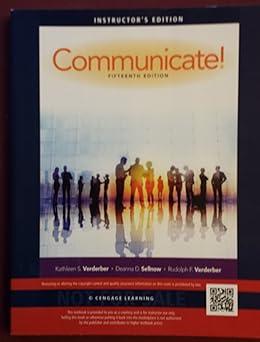1. Cultures and co-cultures may assign meaning to specific words and combinations of words that differs from...
Question:
1. Cultures and co-cultures may assign meaning to specific words and combinations of words that differs from their semantic meaning. For example, in English we associate the word “pretty” with women and “handsome” with men, even though both refer to physical beauty. So choosing to say “She is a pretty woman” sends a different message than saying, “She is a handsome woman” (Chaika, 2008). Cultures also use idioms, which are expressions whose meaning is different from the literal meanings associated with the words used in them. So imagine how confusing it is to someone learning English when we say, “That test was a piece of cake” or “that test was a real killer.”
Step by Step Answer:

Communicate
ISBN: 9781305502819
15th Edition
Authors: Kathleen S. Verderber, Deanna D. Sellnow, Rudolph F. Verderber






